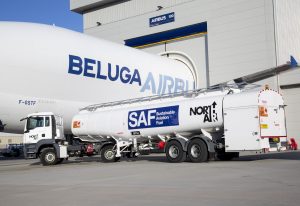Manchester-based Commercial Finance arm of listed specialist Secure Trust Bank saw its loan balances rebound sharply towards the end of 2020, closing at £ 230.7m.
While the impact of the COVID-19 pandemic fell eight percent to £ 251.7 million in the twelve months to December 2019, the company saw strong growth in the final quarter of 2020. This was due to the company’s continued support from SMEs through a combination of new clients and the expansion of existing client facilities, including the provision of the CBILS and CLBILS loan programs.
In total, Secure Trust Bank provided more than £ 50 million to companies across the country through its loan programs and became one of the first alternative lenders to be accredited for the larger CLBILS facility. Since being accredited for both programs, the company has been working closely with companies from a wide range of sectors to provide financial assistance to ensure they can maintain relationships with suppliers and plan for recovery.
In the last quarter, the company also closed its largest deal since its inception in 2014 – a £ 50 million working capital facility made available to British Steel to enable the business to expand production and sales .
Other transactions during the year include a confidential £ 16 million billing package for dash cam maker Nextbase to drive national and international growth, as well as support for the private equity firm’s takeover of publishing house Archant Rcapital with a facility of £ 5 million.
Paul Johnston, Regional General Manager, Northwest, Secure Trust Bank Commercial Finance, said, “With the world reopening in 2021, we expect a significant resurgence in the appetite of companies looking to capitalize on growth opportunities. We saw during the pandemic that lenders need to innovate with their funding structures to get the best results, and we will continue to do so to aid the recovery. “
:: ::
New “intelligent” containers
Eighty-two ‘smart’ litter bins in Salford will now let council workers know when to empty.
The containers being tested at Ordsall and Salford Quays have sensors that monitor how full they are. The collections can then be tailored to containers that need immediate attention rather than the crews checking every container in the area.
The trash cans are also twice the size of the ones being replaced and, if successful, could be rolled out to replace more of the 1,800 trash bins across the city.
Peter Openshaw, Strategic Director, said, “We have seen a massive increase in the number of people visiting local parks and open spaces and using our litter bins over the past year. Some trash cans are now emptied twice a day at “hotspots” because areas have become so popular.
“The smart bins will help us provide a timely response that the public will surely appreciate. This also saves employees time to address other environmental issues in the city and improves our carbon footprint by reducing journeys.
:: ::
Steve Johns
National law firm Weightmans has been selected to provide legal services to Transport for Greater Manchester as part of their new Professional Services Framework.
Transport for Greater Manchester (TfGM) is the transport delivery arm of the Greater Manchester Combined Authority, which provides services such as the Manchester Metrolink, which is the second largest mass transit network in the UK after the London Underground.
Weightmans was the highest scoring bidder selected for the legal services panel and provided legal advice to the organization and the 10 Greater Manchester Local Authorities. This includes advice on infrastructure and regeneration projects, major transport services, environmental initiatives and innovation projects to improve connectivity and accessibility.
The framework runs until March 2025 and replaces the previous TPS framework from TfGM, which ended in March 2021.
Steve Johns, Infrastructure Specialist and Partner at Weightmans, said, “We are delighted that not only have we been successfully appointed to the TfGM panel, but that we are the highest scoring bidder for the legal services lot in such a competitive process. Greater Manchester has not been immune to the effects of COVID-19, and transport will play a vital role in both the economy and the region as our communities adjust to the new normal. “
:: ::
Lifestyle Fitness and V1BE have announced a second partnership to deliver a luxury health club in central Manchester, due to open in summer 2021.
The new club – part of the Hyphen development – is located on Mosley Street in central Manchester. At the opening it will be the 29th club in the Lifestyle Fitness portfolio and the second in partnership with the studio operator of the boutique class V1BE.
The luxury facility will be spread over two floors and an underground level offers members an atmospheric training zone with state-of-the-art fitness equipment, functional rigs and free weights on the ground floor. At the street level, a large V1BE studio offers a range of landmark high-intensity courses and boutique workouts.
“We are very excited to announce our Manchester Central Club,” said James Lawrence, general manager of Lifestyle Fitness. “Our goal is to provide the best training in Manchester. Whether it’s a lunchtime session, a V1BE class after work or a relaxing weekend training session, we’ve carefully designed each space to be done in style can. “
Lifestyle Fitness and V1BE have already announced a launch date for their first club in Ancoats, which will open its doors to the public on May 17th. The second club on Moseley Street will soon follow.
:: ::
A beluga that runs on biofuel
Aircraft manufacturer Airbus has taken the next step in reducing its industrial carbon footprint with the maiden flight of a Beluga supertransporter powered by sustainable aviation fuel (SAF) from the aerospace company’s Broughton facility near Chester, which employs around 4,500 people work in the manufacture of airplane wings.
The line station, which transports aircraft wings to Toulouse, Hamburg and Bremen with the Beluga fleet, is the second European Airbus location to use SAF after Hamburg introduced the fuel for its freight activities at the end of 2019.
“This first flight of a Beluga transporter from Broughton, which is partially operated by SAF, marks an important milestone in Airbus’ drive to decarbonise its industrial operations,” said Tony Derrien, project manager for sustainable aviation fuels at Airbus.
“Combined with our ongoing research into the potential of 100% SAF on commercial flights, reducing fossil fuels in our own operations underscores Airbus’ commitment to reducing the impact of our manufacturing base and contributing to a more sustainable future for the aviation sector in general.”
Sustainable aviation fuels are currently certified by regulators for use up to 50% on commercial flights. The Beluga fleet, operated from Broughton, will initially be loaded with a 35% blend of non-fossil fuels to reduce CO2 emissions by more than 400 tons over the next three months. The SAF used by the Beluga fleet is made from used sustainable raw materials such as cooking oil and delivered by Air bp to Airbus in Broughton and Hamburg.




